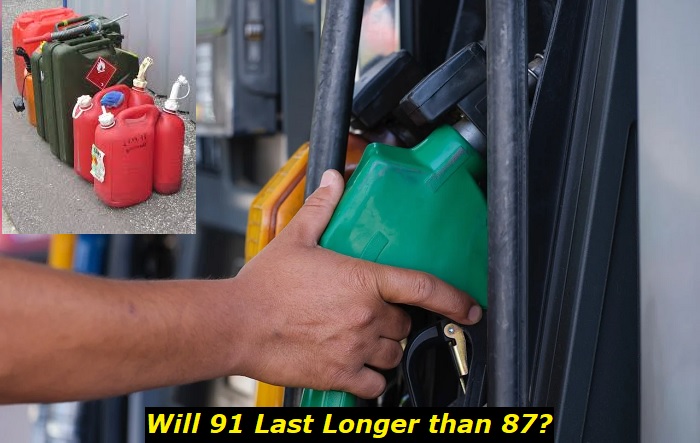Many drivers ask us questions about the quality of the gasoline after different events like sitting for a long time. And many of them are concerned if the 91 gas can last longer in the tank than the 87 type of fuel. So, I decided to write the article explaining this in all detail. Hope you will find all the needed answers here.
In short, the 91 gas won't last longer in your tank than the 87 gasoline or any other type of gas that is made according to industry standards and is of normal quality. The things that affect the longevity of gasoline just don't include the octane number.

So, the long-standing myth saying that you should buy premium if your car is going to sit for a while is nothing but a myth. There is no reason in buying premium because it will last as long as the regular fuel.
But there are some things you should know about gasoline longevity. Let's see!
How long do 87 and 91 gas types last?
Generally, gasoline fuel in the US lasts about a year before you can't use it. But the gas will start losing its quality after about a month of sitting. The oxidation comes into action and the fuel degrades step by step. In about a year of being in the tank of your vehicle or in the canister in your garage, the fuel will become absolutely unusable.
This is true for American types of fuel, whatever you buy - premium, mid-grade, or regular. All types of fuel are considered to be E10 which means they may have up to 10% of ethanol in them. And this is what decides their longevity.
You may notice that I said, "up to 10%". It means that standards allow manufacturers to use 1% or 5% or even 10% of ethanol in their fuels. So, while one type of fuel from one manufacturer will last 6 months, the other type will only last 3 months before it starts degrading.
The rule of thumb: use your fuel within three months after the date you buy it. And also don't use the fuel that you bought more than a year ago.
Though if you manage to find ethanol-free fuel, it's going to last about 3 years till it completely loses its properties. It's not that seldom that you can find such fuel in American gas stations. Though measuring the part of ethanol in gas is not that easy and requires special knowledge and equipment.
What else can affect the time your gas may last?
The amount of ethanol in the fuel is really the main factor that affects the time your fuel can be OK to run the engine. But there are also other factors that can affect the speed of the oxidation process with the fuel.
Here they are:
- The way you store the fuel. If gas is stored in an open reservoir, it will most likely exhaust in several days. It evaporates heavily and all the burning elements will just vanish very quickly.
- The temperature of storage. High temperatures of storage are extremely bad for fuel and can catalyze its oxidation, so cool and stable temperatures are the best thing you can provide your gas with.
- Purity of the fuel. If it's mixed with something else, it may start the reaction of oxidation faster than you think. So, clean fuel will last longer in storage.
- The quality of fuel. Low-quality fuels are made without respecting standards and guidelines and may not last as long as you expect just because they have lots of unwanted elements in them.
So, this is what you need to know about the longevity of the fuel in storage. But when you are asking "How long does the fuel last?", you may be asking about the MPG. So, I'm ready to answer that question, too.
Will 91 gas last longer than 87 in terms of MPG?
The short answer is yes, in most cases, 91 may last longer in your vehicle and give a little more power. But the difference is actually negligible. While your car may go 30 MPG on 91 gas, it may go 29.8 MPG on 87 gas. The difference is not actually worth discussion, I would say.
But there is an important point I should outline. If your vehicle is manufactured for premium, you should better buy premium. Respecting the octane number requirement is important because otherwise, your engine may get damaged really soon after you start economizing on the fuel and buying the cheapest option.
You may want to look into the specs of your vehicle and check if it's meant to work well on regular fuel. If not, better avoid buying cheaper fuel because you will get engine knocks that will soon lead to heavy engine problems that are hard and expensive to repair.
In case your vehicle is OK to work on regular, you may choose any fuel. With premium or mid-grade, you will get a little more power. But again, the difference is not worth the conversation.
What will happen if you pour old fuel into your car?
Many of us have some fuel supply in garages for our lawnmowers, chainsaws, and power generators. Eventually, you may forget about 10 gallons of fuel standing in your garage for half a year, and then remember that you have this treasure in a couple of canisters. Can you still use this fuel to drive your car?
The situation is tempting - you can go about 250 miles for free now because you didn't even remember you had this fuel. But will your car burn this old fuel?
Here are some considerations:
- if the fuel is half a year old and was stored properly, it should be OK to use in most cars;
- if it was stored longer, I wouldn't experiment and would rather use it in my lawn mower that is cheaper to repair;
- also, I wouldn't use this fuel in vehicles with direct injection or even more complicated systems of fuel supply;
- it's also worth avoiding using this fuel in expensive vehicles like vintage cars, sports cars, performance vehicles, etc.
If you own an average van or truck, you may still use this fuel and it won't even notice the difference. Maybe, the gas mileage will be a little worse because of the degrading octane number. But it shouldn't be that bad anyway.
So, yes, you can still use some old fuel in your vehicle but in that case only if this fuel has been there for up to half a year and was stored properly. Otherwise, it's not worth the risk - you may cause damage to your fuel supply system and pay for repair much more than that fuel costs.
What fuel to buy for reserve: 87 or 91?
If you want to buy some gas and just put it there in your garage just in case, the idea is not really good. It's like buying a barrel of milk and trying to keep it fresh in your fridge for a month after you open it. Your fuel will anyway degrade and buying it directly from the gas station is always better than getting it from the canister in your garage.
If you still decide to make some reserve of fuel, it doesn't matter which one you get - 87, 91, or 93. It only matters, in this case, which type of fuel you'll be using in which equipment. If your car doesn't digest 87, don't buy it.
But in terms of storage, it doesn't make a difference in what you buy. So, maybe you shouldn't overpay and just buy regular.
Will 91 gas still be premium after half a year of storing?
Another question that people often ask is whether they can use premium gas after storing it for half a year or more and whether it will still be premium. The answer is uncertain because, in the US, everything that has a higher octane number than 91 is considered premium. So, it can be 91 or 95.
And the period when this fuel will still be considered premium will depend on the initial octane number. The thing is that the octane number changes after some time. It degrades and the burning components of fuel evaporate which causes a lower octane number in the end.
So, if you buy 91 with exactly 91 octane number, in half a year, it may be 89 or something like that. It means that the vehicle that is supposed to work on premium gas only will struggle to digest this gas and it can even hurt it if used for a long time.
Final thoughts
Probably the best strategy for buying fuel is to always choose the type of fuel that your car is claimed to use. Also, if you want to store your fuel, remember that the maximum duration of storage should be about a year. It's better to avoid using gas in cars after half a year of storing it. After this milestone, better use this fuel in less expensive equipment such as lawnmowers or power generators.
But you should know that the initial octane number doesn't affect the longevity of your fuel. It only affects its initial properties.
About the authors
The CarAraC research team is composed of seasoned auto mechanics and automotive industry professionals, including individuals with advanced degrees and certifications in their field. Our team members boast prestigious credentials, reflecting their extensive knowledge and skills. These qualifications include: IMI: Institute of the Motor Industry, ASE-Certified Master Automobile Technicians; Coventry University, Graduate of MA in Automotive Journalism; Politecnico di Torino, Italy, MS Automotive Engineering; Ss. Cyril and Methodius University in Skopje, Mechanical University in Skopje; TOC Automotive College; DHA Suffa University, Department of Mechanical Engineering






Add comment